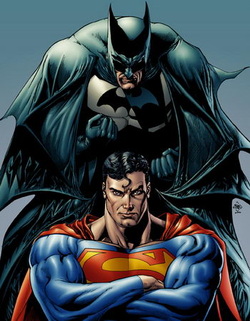|
Fear is a motivator that works, that is why it is so often used - knowingly and unknowingly. Fear-based leadership is a style that derives from one's need for control.
This flavor of control is often justified as a means to protect people. This was the driving force behind Ra's al Ghul's attempt to destroy Gotham City in the 2005 film Batman Begins. He determined the city had lost all morals and needed to be cleansed of all the filth and sin. He wanted to protect the world from Gotham's moral decay. In the Dark Knight Rises, the new villain Bane shares in Ra's vision for the destruction of Gotham City and is driven to fulfill his original mission. [Caution: Spoiler Alert!] Bane displayed very effective fear-based leadership tactics. He was intimidating, terrifying, articulate, and manipulative. We also learn he was well connected with Miranda Tate. For most of the film, the audience is lead to believe Bane is the sole leader in the takeover of Gotham City. However, after Miranda Tate reveals herself as Talia al Ghul, the daughter of Ra's al Ghul, we understand that only through their twisted alliance could Bane actually accomplish taking control of Gotham City. Talia was the true mastermind. Nevertheless, Bane's leadship skills should not be discounted. In the film he is referred to as just a "Mercenary," a hired gun. But what did he bring to the table? Ah yes, human resources. Bane organized and lead a sizeable battalion. He did so by manipulating them. He sought out the desperate, strung them along, giving them a false sense of power and security. He used this battalion to strategically plant bombs throughout Gotham and with Talia's backing, seized control of Wayne Enterprises. He eventually went on to release all the inmates in Gotham's prison - arming and organizing them to combat the Gotham City Police Department. He inspired the prisoners by manipulating them. He used Commissioner Gordon's statements, the truth behind the real Harvey Dent, to unite them against a common enemy who brought them to justice. Bane understood how to harness the power of vengeance and create order out of chaos. There are really two aspects to his leadership style:
In business, if a leader's attention turns from "How can I do the right thing for employees and customers?" to "How can I keep my job, status, and control?" then fear is this leader's weapon of choice. If you can answer YES to a majority of these questions, then fear-based leadership is rife in your organization:
An organization that hires intelligent people, setting them loose to solve real-world will be a successful and innovative leader in its industry. Fear-ridden employees only try to maintain the status quo, they don't discover innovative solutions. This is easy to see. Yet, fear-based leadership is difficult to break because cogs don't speak up, they stay quiet and keep their heads down - while this is convenient, it's not sustainable. The truth about fear-based leadership is that it stems from a lack of self confidence. In addition, a fear-based manager, like Bane, has profound anxiety about making a wrong decision and is afraid of what others will think if he makes a poor decision. Did you see how scared he was when Batman returned from the prison in Asia? Yeah, he screwed up! Big time! He underestimated his competition because he was enjoying the glory of his thousands for scared, obedient minions. Fear-based leadership really isn't leadership at all. It doesn't move an organization over obstacles and into a sustainable position for the future. It's actually the opposite of leadership because with it there is no vision, innovation is stifled, and obsoleteness emerges. To be an effective leader, you have to earn everyone’s respect every single day. You do this by serving, supporting, and making sacrifices for your teammates. You must position yourself on higher ground in order to lift others up. Leadership is stepping up, taking action, and inspiring others to work alongside you.
0 Comments
I'm still surprised when I'm talking to grown adults that are so concerned about following "the rules." They have a great idea and want to do something amazing, but feel like they need to get permission because they don't want to "get in trouble." As I dialogue with such nervous folks I try to find out what they're so scared of. Often, it turns out they're afraid of some unlikely consequence...like accountability if their plan/project fails. So what! You failed, you learned, now move on. Don't be ashamed to fail. I used to avoid hard classes in school because I was afraid I would fail. So I took classes I knew I could get an A in. "A" huge mistake that now I regret! It wasn't just school, I avoided going on hikes in scouts because I was afraid I couldn't keep up. I missed many great adventures because I played it too safe. The race to the bottom is easy to win. Everyone at the bottom chose to be there because they played it safe. They were too scared to break "the rules," to "get in trouble," to "fail." "Failure is not falling down, but refusing to get up." - Chinese Proverb Thus, failure is a choice...Get over it!  You need 'something' from everyone you deal with, from clients to coworkers...vice presidents to supervisors...constituents to shareholders...friends to family...AND guess what? Everyone has biases, attitudes, and expectations. When you're dealing with someone you need 'something' from I recommend you adjust your worldview in order to reach them. This is a more effective approach than assuming everyone sees and hears the same (or different) thing as you. In a recent blog post, Seth Godin compared two very common worldviews that I'd like to touch on: BATMAN: He comes to the world angry. His origin story is filled with vengeance and revenge, and in his iconic backstory, he is the merciless enforcer of right and wrong. Batman-types see the world as a zero-sum game, and battles are either won or lost. SUPERMAN: He comes to our world with his gifts and sees his life as an opportunity and an obligation, one that he embraces. Superman could easily kill all the bad guys in a heartbeat, but he never does. For him, every challenge is an opportunity for healing. He believes in redemption and finds pleasure in using his gifts to help others. Picture yourself pitching a product to a room filled with Batman personalities. Now, how are you going to adjust what you planned to say? Speaking to this group will be tremendously different than speaking to a group of people who are more like Superman - advantaged and benevolent. There are many types of people with a variety of worldviews. It is impossible to have a healthy working relationship with people you need help from (and who need your help) if you do not adjust your worldview or attitude or biases or expectations. I hope you will work on your flexibility (think Spiderman), because as you do, you will increase the likelihood of reaching more compromises and getting help from other people.  I recently used this metaphor with a 4-H youth leadership group. They thought it made simple sense and we had a deep discussion about the 5 things to be a great pencil afterwards. THE PENCIL The pencil maker took the pencil aside, just before putting it into the box. "There are five things you need to know before I send you out into the world," he said. "Always remember these five things, and you'll be a great pencil. ONE: You are capable of many great things, but only if you allow yourself to be held in someone's hand. TWO: You will experience a painful sharpening from time to time, but you'll need it to become a better pencil. THREE: You have the ability to correct the mistakes you make. FOUR: The most important part of you will always be what's inside. FIVE: On every surface where you are used, regardless of its condition, you must leave your mark. The pencil understood and promised to remember. ~Author Unknown Anyone with a website that wants increased traffic must watch this video...THEN GO TO WORK ON IT! |
Paul Hill, Ph.D.I design, plan, and evaluate economic development programs for Utah State University. Archives
September 2022
Search this site:
|


 RSS Feed
RSS Feed
